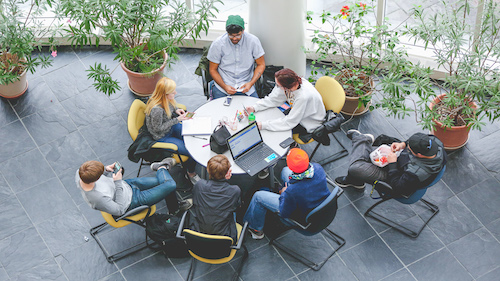
Being a commuter campus comes with plenty of well-documented plusses and minuses. One of the biggest general challenges, of course, is creating a sense of community that transcends the academic experience. Many first-year students say it’s hard to make friends when you don’t have the opportunity to live in a residence hall. Family and work obligations outside of school, which a majority of our students report having, can make it difficult to stick around campus for non-class activities. Even the commute itself, if you do it solo, can be an isolating experience.
For the past few months, a couple of UM-Dearborn’s strategic planning teams have been busy exploring solutions for these types of challenges, which could ultimately reshape the student experience in some significant ways. Dean of Students Amy Finley, who’s chairing a team focused on commuter issues, says there’s a lot of excitement about utilizing space on campus differently in the future. In particular, Finley says it’s important to have enough places for students to hang out or work so they don’t feel the need to go elsewhere during non-class time. “We’re thinking about designing spaces so campus can really be a home away from home,” Finley says. “If you have a couple hours between classes, there have to be places for students to sit and study and socialize — and that are equipped with the right amenities, like charging infrastructure and food service. And we really think outdoor space can play a big role too. We have this beautiful campus, but some of it is underutilized.”
Another interesting idea: Rethinking the commute itself. Finley says tools like podcasts could deliver critical student information while folks are en route to campus. Easy-to-use rideshare and carpool programs could make the commute more social — and chip away at campus’ carbon footprint. In addition, her group is exploring how more flexible schedules for services could help students avoid some unnecessary driving altogether. “Let’s say you were going to come in on Wednesday just for an academic advising appointment. Now that we’re all experienced with Zoom, though, maybe that appointment can be handled remotely. Likewise, we think many more students could attend evening talks or events if they had the option to stream them online.”
Professor of Psychology Marie Waung says that emphasis on connectivity jibes with the thinking on their team, which is exploring ways to build out the first-year experience for both new students and transfers. Their recent survey of 350-plus current students revealed some major themes about first-year challenges. First and foremost, students say the attend-class-go-home rhythm of commuter life makes it difficult to build friendships and other social connections. Beyond that, many students report having challenges adjusting to college-level academic expectations, as well as difficulty navigating college logistics like registration, financial aid and Canvas, the campus’ learning management system.
Waung says their team is developing a set of overlapping solutions for these very issues, many of which build on successful programs we already have on campus. For example, connecting first-year students with peer mentors could be helpful both for answering typical new student questions and for forging early social connections. Another idea: Building out the Community Read program, where the campus collectively reads and discusses a topical book, into a broader first-year slate of themed activities. Similarly, Waung says there’s interest in exploring whether the College of Arts, Sciences, & Letters’ “foundations” model could be expanded campuswide. Under this approach, academic courses with catchy names like “Democratizing Democracy” or “Real Housewives of Crime: Crime, Law, & Reality TV” are embedded with activities designed to help students build the core academic and collaborative skills they’ll use during their student careers.
Next up, Waung and Finley say they're excited to get feedback from students, faculty and staff about some of these proposed solutions. Look for an opportunity to do that in the coming months. In the meantime, you can check out the top ideas from all four main strategic planning working groups: student experience and success, DEI, faculty and staff excellence and economic stability. University leadership is also exploring holding a strategic planning town hall to update the campus on implementation progress in April.
###
Story by Lou Blouin. As always, you can stay up to date on the latest strategic planning news on the main Strategic Planning website.





